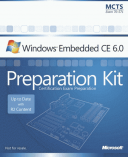Книга: Microsoft Windows Embedded CE 6.0 Exam Preparation Kit
Operating System Benchmark (OSBench)
Разделы на этой странице:
Operating System Benchmark (OSBench)
The OSBench tool can help you measure system performance by identifying the time that the kernel spends managing kernel objects. Based on the scheduler, OSBench collects timing measurements by means of scheduler performance-timing tests. A scheduler performance-timing test measures how much time basic kernel operations, such as thread synchronization, require.
OSBench enables you to track timing information for the following kernel operations:
? Acquiring or releasing a critical section.
? Waiting for or signaling an event.
? Creating a semaphore or mutex.
? Yielding a thread.
? Calling system APIs.
NOTE
OSBench test
To identify performance issues in different system configurations, use OSBench in conjunction with a stress test suite, such as the Microsoft Windows CE Test Kit (CETK).
The OSBench tool supports several command-line parameters that you can use according to the following syntax to collect timing samples for kernel operations:
osbench [-all] [-t test_case] [-list] [-v] [-n number] [-m address] [-o file_name] [-h]
Table 3-2 describes the individual OSBench command-line parameters in more detail.
Table 3-2 OSBench parameters
| Command-Line Parameter | Description |
|---|---|
| -all | Run all tests (default: run only those specified by -t option): |
| TestId 0: CriticalSections. | |
| TestId 1: Event set-wakeup. | |
| TestId 2: Semaphore release-acquire. | |
| TestId 3: Mutex. | |
| TestId 4: Voluntary yield. | |
| TestId 5: PSL API call overhead. | |
| TestId 6: Interlocked API's (decrement, increment, testexchange, exchange). | |
| -t test_case | ID of test to run (need separate -t for each test). |
| -list | List test ID's with descriptions. |
| -v | Verbose: show extra measurement details. |
| -n number | Number of samples per test (default=100). |
| -m address | Virtual address to write marker values to (default=<none>). |
| -o file_name | Output to comma-separated values (CSV) file (default: output only to debug). |
Check out the OSBench source code to identify the test content. You can find the source code at the following locations:
? %_WINCEROOT%PublicCommonOakUtilsOsbench
? %_WINCEROOT%PublicCommonOakUtilsOb_load
Test results are by default sent to the debug output, but can be redirected to a CSV file.
NOTE
OSBench requirements
The OSBench tool uses system timers. The OAL must therefore support the QueryPerformanceCounter and QueryPerformanceFrequency functions initialized in the OEMInit function.
- System tools used for debugging
- Integrated Secure Communications System
- Когда включаю компьютер, при загрузке пишется Insert system disk and press enter. Что нужно делать?
- На всех дисках моего компьютера есть папка System Volume Information. Для чего она нужна?
- 14.5.1. Open Systems Interconnection
- 5.3. TRENDS IN DISTRIBUTED FILE SYSTEMS
- Абстрактный базовый класс FileSystemInfo
- 1. Basic microprocessor systems
- CHAPTER 12 System-Monitoring Tools
- Navigating Through the File System
- Shutting Down the System
- Rebooting the System




